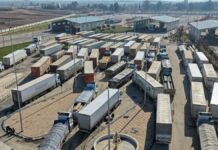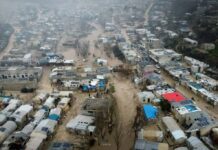
Amid recent anti-Syrian riots and attacks that erupted in Turkey and spilled over to violence in northern Syria, Turkey closed several border crossings, disrupting services and mobility in the region. The violence, sparked by anti-refugee sentiments in Turkey, demonstrated contrasting responses from the Syrian Interim Government (SIG) and the Syrian Salvation Government (SSG), revealing stark differences in their ability to maintain order and service continuity.
The riots, which started in response to attacks on Syrians in Kayseri province in central Turkey, quickly escalated in northern Syria. Demonstrators stormed the Bab al-Salama crossing in the northern Aleppo countryside and clashed with Turkish institutions and military posts in Afrin. The Turkish authorities responded by closing all border crossings with northern Syria, including Jarabulus and Idlib’s Bab al-Hawa.
In SIG-controlled areas, the closures have led to a significant halt in services. Crossings such as Bab al-Salama and Jarabulus remain closed, impacting medical, relief, and military activities. Turkish citizens and those with dual nationality are the only exceptions, permitted to cross back into Turkey. Additionally, the region has faced interruptions in electricity and internet services, which are slowly being restored but are not yet back to pre-protest levels.
However, the Bab al-Hawa crossing, crucial for commercial traffic and travelers, reopened less than 24 hours after the closure, reflecting the SSG’s swift response to maintain order. Public relations officials from the SSG denied rumors of increased prices for basic materials and fuel in Idlib, asserting that supply patrols have been actively verifying prices and preventing monopolies. They also reported an abundance of essential goods in main warehouses and continued normal sales activities.
Mudar Omar, Director of Public Relations at the Ministry of Economy and Resources, stated, “All basic materials are well available in the liberated areas, and there is no interruption of any material. There is an abundance of vegetables and locally produced goods.”
These developments come amid ongoing tensions in northern Syria, where the reliance on Turkey for communication and electricity services has highlighted vulnerabilities in the region’s infrastructure. The ability of local governments to manage crises and maintain order is crucial in mitigating the impact of external shocks and ensuring the well-being of their populations. As the situation evolves, the focus remains on how these governments will address the challenges posed by the recent unrest and what measures will be implemented to prevent future disruptions.








